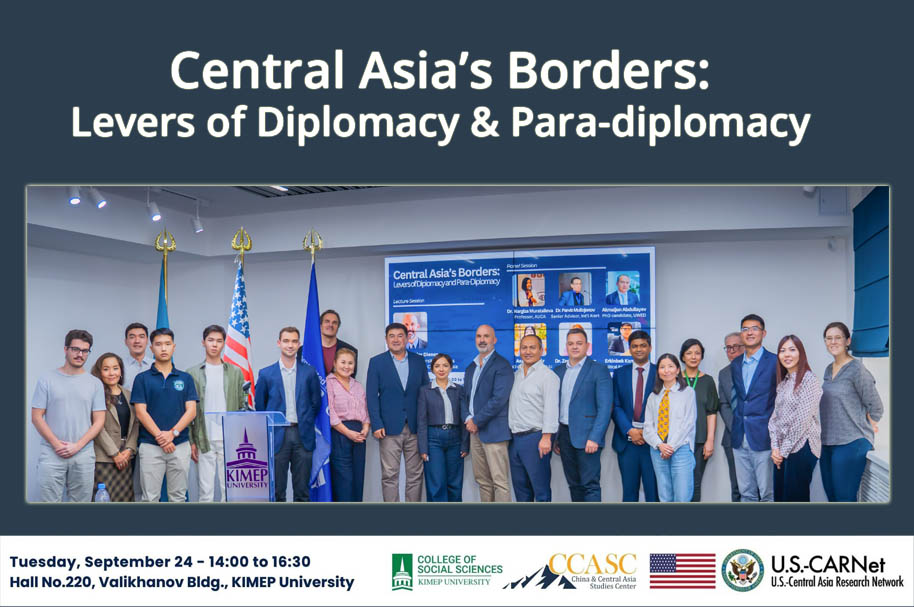On September 24, 2024, the China & Central Asia Studies Center at KIMEP University’s College of Social Sciences, in collaboration with the American Councils, hosted an academic dialogue session titled “Central Asia’s Borders: Levers of Diplomacy and Para-Diplomacy.” The event provided a platform for Central Asian and U.S. scholars from the U.S.CARNet research network to discuss China’s growing presence in the region and the implications for Central Asian nations.

The session commenced with remarks from Dr. Damian Riviez, Vice President of Academic Affairs at KIMEP University, who welcomed attendees and stressed the significance of collaborative research on Central Asia's unique challenges. Michelle Yerkin, U.S. Consul General, followed with an opening address emphasizing the importance of academic exchanges between U.S. and Central Asian scholars. She highlighted how these interactions can build deeper understandings and forge closer ties between nations, ultimately benefiting the academic and diplomatic landscapes of both regions.




The lecture session that followed featured a talk by Dr. Alexander Diener, Professor at the University of Kansas, who examined the dynamics of people-to-people relations at Central Asia’s borders. Rather than focusing solely on geopolitical boundaries, Dr. Diener shed light on para-diplomacy—interactions occurring among individuals and communities that straddle borders. He explored issues of identity and belonging, challenging the common assumption that border communities lack a sense of civic identity. In fact, Dr. Diener noted that research shows that while these communities maintain close ties with kin on both sides, they remain comfortable with their civic national identities.


After a short coffee break, the panel session began with Dr. Milen Filipov, Dean of the College of Social Sciences (CSS), extending his welcome to the panelists. He encouraged the scholars to continue their critical research and expressed that KIMEP and CSS are always open to hosting them again in the future to share the results of their work. Following this, Dr. Assylzat Karabayeva facilitated the session, inviting the scholars to introduce their projects.
The panelists then introduced their collaborative research projects that examine various aspects of China-Central Asia relations, with each scholar sharing insights into their ongoing work.
Erkinbek Kamalov, a Political Analyst at the Research Center for Security and Geopolitics Studies in the Kyrgyz Republic, outlined his research on Kyrgyz-Taiwanese relations. In partnership with Dr. Megan Greene from the University of Kansas, he is investigating the activities and impact of Taiwanese NGOs within Kyrgyzstan. Next, Assel Bitabar, a Ph.D. candidate at M. Narikbayev University in Kazakhstan, shared that she is collaborating with Dr. Sunnie Rucker-Chang and Dr. Felix Chang from Ohio State University to study China’s soft power narratives in Kazakhstan, particularly through social media. The team is considering a comparative approach, that might help extend their analysis to neighboring regions to gain a broader understanding of China’s influence across Central Asia.


Dr. Nargiza Muratalieva, from the American University of Central Asia, shared a few remarks on her project with Dr. Alexander Diener, which focuses on Kyrgyz-Chinese border activity. Their research examines cross-border trade, para-diplomacy, and transit activities, looking closely at how these interactions affect local communities and shape regional connectivity. Up next From Uzbekistan, Akmal Abdullayev, a Ph.D. candidate at the University of World Economy and Diplomacy, spoke about his research with Dr. Maria Adele Carrai from Columbia University. Their project investigates Chinese investment in Central Asia’s agricultural sector, exploring how this involvement impacts food security and agricultural development across the region.
Dr. Zarina Kakenova of L.N. Gumilyov Eurasian National University is working with Dr. Elizabeth Wishnick of Columbia University on a project examining China’s use of soft power in Kazakhstan. They are specifically looking at educational programs as a means for China to cultivate influence and foster cultural exchange. Finally from Dushanbe, Dr. Parviz Mullojonov, Senior Advisor on Central Asia for International Alert, discussed his work with Dr. Andrew Nathan and Dr. Morris Rossabi at Columbia University. Their research is focused on modern China-Tajikistan relations, with a particular emphasis on China’s soft power strategies in Tajikistan, considering how these efforts shape public perception and bilateral relations.

Throughout the session, the audience remained highly engaged, with both students and faculty members actively participating in the discussion. Attendees asked insightful questions, shared their thoughts, and offered perspectives on the research topics, making it a truly interactive and lively session.
The event concluded with a sense of anticipation for future findings, as scholars continue their research and build on the ideas exchanged during this dialogue. CCASC and the College of Social Sciences at KIMEP University remain committed to fostering such discussions and supporting scholarly pursuits that illuminate the evolving dynamics in Central Asia.

